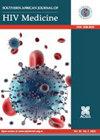Acceptability of short text messages to support treatment adherence among adolescents living with HIV in a rural and urban clinic in KwaZulu-Natal
IF 1.6
4区 医学
Q4 INFECTIOUS DISEASES
引用次数: 13
Abstract
Background The use of mobile communication technologies (mHealth) has improved adherence and viral suppression among HIV-infected adults. Adolescents have disproportionally lower levels of adherence and viral suppression compared with adults, potentially impacting the goal of 90% viral suppression by 2030. Objectives The aim of this study was to evaluate the acceptability of using short message service (SMS)-based mHealth interventions as a tool to improve adherence in HIV-infected adolescents in a rural and urban clinic in KwaZulu-Natal (KZN). Method A cross-sectional study with a sample size of 100 participants was conducted in a rural and urban clinic in KZN, from January 2018 to June 2019. Fifty participants were sequentially enrolled from each clinic. A questionnaire was self-administered with the assistance of the treating clinician depending on the adolescent’s level of understanding. Informed consent was obtained from guardians and questionnaires were anonymised. Appropriate descriptive and comparative statistics were used. Results The mean age of participants was 15 years, with 88% having access to a mobile device (MOD). There was no significant difference in MOD ownership between rural and urban participants. Majority of participants (65%) were willing to receive SMS-based adherence support with no difference between rural and urban area. Conclusion With high rates of MOD ownership and acceptability (willingness to use mHealth to improve health status), SMS-based mHealth interventions have the potential to improve adherence and viral suppression in adolescents living with HIV in both rural and urban KZN. Further studies with a larger sample size need to be conducted to further explore these findings.在夸祖鲁-纳塔尔省农村和城市诊所接受短信,以支持感染艾滋病毒的青少年坚持治疗
背景移动通信技术(mHealth)的使用提高了感染艾滋病毒的成年人的依从性和病毒抑制能力。与成年人相比,青少年的依从性和病毒抑制水平低得不成比例,这可能会影响到2030年病毒抑制率达到90%的目标。目的本研究的目的是评估在夸祖鲁-纳塔尔省(KZN)的一家农村和城市诊所使用基于短信服务(SMS)的mHealth干预措施作为提高艾滋病毒感染青少年依从性的工具的可接受性。方法2018年1月至2019年6月,在KZN的一家农村和城市诊所进行了一项横断面研究,样本量为100人。从每个诊所依次招募50名参与者。根据青少年的理解水平,在治疗临床医生的帮助下自行填写问卷。获得监护人的知情同意,并对调查问卷进行匿名处理。使用了适当的描述性和比较性统计数据。结果参与者的平均年龄为15岁,88%的人可以使用移动设备。农村和城市参与者在国防部所有权方面没有显著差异。大多数参与者(65%)愿意接受基于短信的依从性支持,农村和城市地区没有差异。结论由于MOD拥有率和可接受率较高(愿意使用mHealth来改善健康状况),基于SMS的mHealth干预措施有可能改善KZN农村和城市青少年感染HIV的依从性和病毒抑制。需要进行更大样本量的进一步研究,以进一步探索这些发现。
本文章由计算机程序翻译,如有差异,请以英文原文为准。
求助全文
约1分钟内获得全文
求助全文
来源期刊
CiteScore
2.80
自引率
11.80%
发文量
41
审稿时长
>12 weeks
期刊介绍:
The Southern African Journal of HIV Medicine is focused on HIV/AIDS treatment, prevention and related topics relevant to clinical and public health practice. The purpose of the journal is to disseminate original research results and to support high-level learning related to HIV Medicine. It publishes original research articles, editorials, case reports/case series, reviews of state-of-the-art clinical practice, and correspondence.

 求助内容:
求助内容: 应助结果提醒方式:
应助结果提醒方式:


